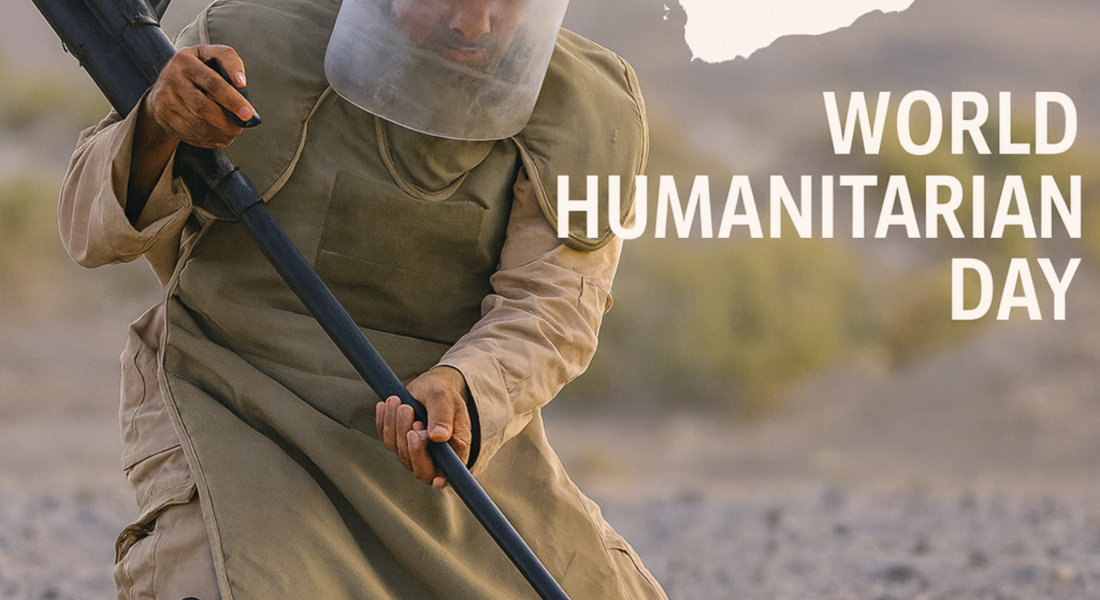On this World Humanitarian Day, Project Masam remembers colleagues killed in the line of duty, alongside humanitarian personnel around the world who have made the ultimate sacrifice in service to others.
World Humanitarian Day (WHD) was established by the United Nations General Assembly to be observed every year on 19 August, commemorating the 2003 Canal Hotel bombing in Baghdad and paying tribute to humanitarian workers who have been killed or injured in the line of duty. It is also a day to rally global support for people affected by crises.
Tribute to aid workers and to our Project Masam colleagues
In the first five months of 2025 alone, at least 128 aid workers were killed across 17 countries, the vast majority national staff. These figures reflect the continued deterioration of operational security for civilian aid operations globally.
Project Masam pays particular tribute to our own colleagues in Yemen who gave their lives safeguarding communities from explosive threats.
Since 2018, more than 30 Project Masam personnel have been killed, including five international explosive ordnance experts, and dozens more have been injured while conducting clearance and explosive ordnance disposal (EOD) operations. We remember them today and every day, and reaffirm our duty of care to all team members in the field.
2025 global humanitarian environment
The global humanitarian environment in 2025 is characterised by protracted conflicts, constrained humanitarian access, and heightened security risks to responders. The Aid Worker Security Database continues to document major incidents against aid workers worldwide and provides the evidence base for security risk management and duty-of-care measures.
In Yemen, the humanitarian crisis remains severe. Around 19.5 million people need humanitarian assistance and protection in 2025, with contamination from Houthi landmines and other explosive remnants of war (ERW) continuing to cause civilian casualties and impede recovery. UN mission operating in mine-affected Hudaydah alone recorded dozens of landmine/ERW incidents with significant civilian harm over the past year, underscoring the scale and persistence of the threat.
The dedication behind humanitarian mine action
Humanitarian mine action is a multidisciplinary effort delivered by clearance teams and a wide range of professionals who often operate out of the spotlight: surveyors, data and information managers, mechanical operators, logistic and fleet specialists, medics, community liaison and risk education officers, quality assurance and safety supervisors, security and access focal points, explosive detection dog handlers, procurement and supply-chain staff, administrative and finance personnel, and journalists and media experts.
Effective operations depend on their combined expertise, on principled partnerships with Yemeni authorities and communities, and on predictable funding.
With the generous support of the King Salman Humanitarian Aid and Relief Centre (KSRelief), Project Masam’s demining teams continue to deliver priority, life-saving clearance in line with International Mine Action Standards (IMAS). As of 17 August 2025, Project Masam has located and cleared 510,527 explosive threats across liberated areas since launch in mid-2018, helping restore safe movement, access to basic services, and economic activity.
Remembering the fallen and supporting those who serve
We honour all humanitarian personnel: in mine action and across health, food security, protection, Water, sanitation, and hygiene (WASH), logistics, emergency telecommunications, and other sectors, who face daily risks to deliver assistance.
We also acknowledge the critical role of donors and partners whose support enables safe, compliant, and accountable programming at scale.
Conflict-affected populations in the Middle East and beyond continue to require sustained humanitarian response amid high insecurity and access constraints. Yemen remains a priority theatre for protection and life-saving mine action due to extensive contamination and ongoing civilian impact.
“Meeting needs at the necessary scale requires more trained personnel, enhanced duty-of-care and security risk management, expanded national capacity, and reliable, multi-year funding for humanitarian operations (including mine action) in Yemen and the wider region,” said Ousama Algosaibi, Project Masam’s managing director, on World Humanitarian Day.
On this day, Project Masam reaffirms its commitment to safer communities, accountable operations, and the highest professional standards, he added.
We remember our fallen colleagues, stand with all aid workers serving in difficult environments, and call for the resources and access required to protect civilians and deliver principled humanitarian action in Yemen.

